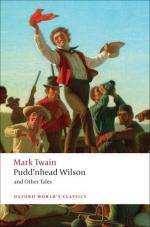We realise that the edifice of public justice is built of precedents, from the ground upward; but we do not always realise that all the other details of our civilisation are likewise built of precedents. The changes also which they undergo are due to the intrusion of new precedents, which hold their ground against opposition, and keep their place. A precedent may die at birth, or it may live—it is mainly a matter of luck. If it be imitated once, it has a chance; if twice a better chance; if three times it is reaching a point where account must be taken of it; if four, five, or six times, it has probably come to stay—for a whole century, possibly. If a town start a new bow, or a new dance, or a new temperance project, or a new kind of hat, and can get the precedent adopted in the next town, the career of that precedent is begun; and it will be unsafe to bet as to where the end of its journey is going to be. It may not get this start at all, and may have no career; but, if a crown prince introduce the precedent, it will attract vast attention, and its chances for a career are so great as to amount almost to a certainty.
For a long time we have been reaping damage from a couple of disastrous precedents. One is the precedent of shabby pay to public servants standing for the power and dignity of the Republic in foreign lands; the other is a precedent condemning them to exhibit themselves officially in clothes which are not only without grace or dignity, but are a pretty loud and pious rebuke to the vain and frivolous costumes worn by the other officials. To our day an American ambassador’s official costume remains under the reproach of these defects. At a public function in a European court all foreign representatives except ours wear clothes which in some way distinguish them from the unofficial throng, and mark them as standing for their countries. But our representative appears in a plain black swallow-tail, which stands for neither country, nor people. It has no nationality. It is found in all countries; it is as international as a night-shirt. It has no particular meaning; but our Government tries to give it one; it tries to make it stand for Republican Simplicity, modesty and unpretentiousness. Tries, and without doubt fails, for it is not conceivable that this loud ostentation of simplicity deceives any one. The statue that advertises its modesty with a fig-leaf really brings its modesty under suspicion. Worn officially, our nonconforming swallow-tail is a declaration of ungracious independence in the matter of manners, and is uncourteous. It says to all around: ’In Rome we do not choose to do as Rome does; we refuse to respect your tastes and your traditions; we make no sacrifices to anyone’s customs and prejudices; we yield no jot to the courtesies of life; we prefer our manners, and intrude them here.’
That is not the true American spirit, and those clothes misrepresent us. When a foreigner comes among us and trespasses against our customs and our code of manners, we are offended, and justly so; but our Government commands our ambassadors to wear abroad an official dress which is an offence against foreign manners and customers; and the discredit of it falls upon the nation.




